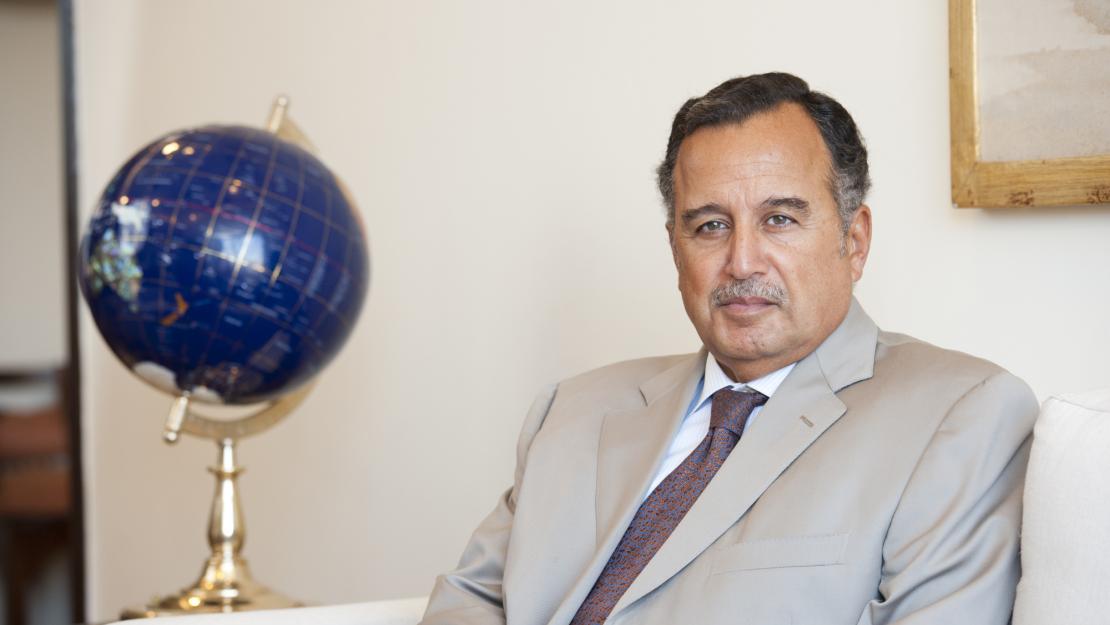
File photo: agencies
I am a proud Egyptian. We are affectionately accused of resorting to the hyperbole in asserting that we are the mother of the world. Hyperbole or not, in many ways, this very much defines our approach to equitable rights and responsibility. We also find zero-sum concepts and policies quite repulsive. We are strong believers in collective approaches to problem solving and have an unwavering commitment to comprehensive rather than stop-gap solutions with all family or community members, sharing in both equitable responsibilities and wealth. Consequently, global comprehensive collective approaches are for us, a sine qua non for sustainability and progress in international relations.
Equally important to highlight is that for Egypt, as a medium-sized state, respect for international law is a cornerstone of constructive international relations. Important as well to reaffirm today is that in the light of all of the above, we are strong believers that the international world order established post World War II is no longer healthy, nor frankly consistent with the 21st century reality. Our reasons are quite straightforward. The now-archaic order was based on concepts like balance of power and informal spheres of influence. It goes without saying, therefore, that Egyptians and I highly appreciate the Global Security Initiative put forth by His Excellency President Xi Jinping, which called for common, comprehensive, cooperative and sustainable security. It is now time to embrace a collective approach.
For decades, we have been told that the world was a safer place, yet military expenditures have increased for the seventh successive year. How can we argue that we are more humane and civilized in the 21st century when we are spending over $2.1 trillion on the military, while 47 percent of the world's population lives below poverty standards in the developed world, and 23 percent below global poverty standards, which are lower? Noteworthy as well is that the military budget of the highest standard is well more than the subsequent eight highest countries combined, even in terms of crude balance of power calculations. This does not augur well for collective security or generally complete disarmament, as called for in the UN Charter and numerous international disarmament treaties. In fact, it appears driven by hegemony goals.
In Europe, we have just witnessed dramatic and regrettable conflict with heavy loss of life. In the Middle East, Palestinians have lived under occupation for over seven decades. We have recently passed through an epidemic and just shortly a horrific earthquake in Turkey and Syria with major loss of life and limited life-saving resources. In Syria, international support was not up to par, and frequently provided with a heavy political overtone. Is this evidence of security? Is this peace? Does this reflect a greater sense of humanity? In all honesty and candidness, the world today is facing a perfect storm with serious consequences for us all. Its security and political relations, as well as its financial and development concepts, are no longer effective or compatible with today's challenges. It is therefore not an exaggeration to assert that the world order needs an immediate and comprehensive overhaul. I even add that resistance or even apathy and hesitation to engage in re-calibrating a new world order in the immediate future will have dire consequences for us all as we move more and more into an era of frustration and conflict, both at the state and people-to-people level.
My first conclusion is that the failed and polarizing concept of balance of power should be replaced by a balance of interest toward equal and collective security. My second conclusion is that as we navigate the challenges and seize the opportunities provided by globalization, multilateralism must be the prevailing nature of our world structure. Bipolarism and unipolarism are neither commensurate nor compatible with the present-day reality or morals. My third conclusion is that there is a strong and urgent need to demilitarize international relations and ensure greater prominence for diplomacy. In this respect, we need to assert rule of law rather than power politics.
We need to shift from a culture of confrontation to a culture of cooperation. We need to critically assess the acute dangers and risks of modern militarization, not only as a catalyst for increased procurement of weapons at the expense of development needs, but also because of synergies between technology and warfare, which allow advanced militaries to engage remotely. That's de-humanizing and facilitating use-of-force decisions for the more advanced. Modern ballistic missiles, remote guiding systems, even drones are just a few examples of this. And there are many other examples like cyber security, et cetera. I caution that technologies are fluid and transferable. What is initially controlled by nation states, not always ethically, will ultimately also be available to non-state parties, including extremists.
I can go on and on reaffirming the need for equitable, collective, comprehensive, and sustainable approaches to security for the common good of the world community. But let me conclude and suffice it to say that I commend China's initiative, and I recommend that it organizes a number of events and actions in different regional and global communities to further discuss these concepts and actionable measures. It will help us invest in the initiative constructively, aiming towards restructuring the prevailing world order.
The author is the former Foreign Minister of Egypt and Senior Visiting Fellow of Institute for Global Cooperation and Understanding at Peking University.
